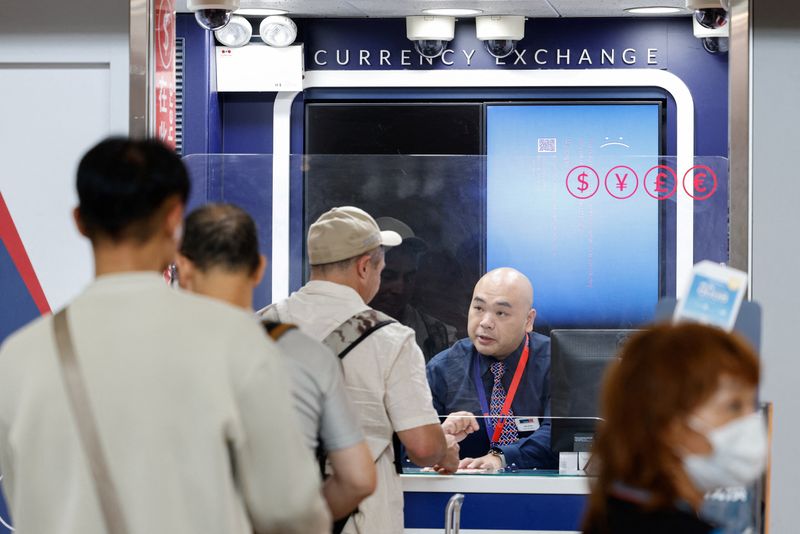By Andrew Mills, Elena Rodriguez and David Shepardson
EDINBURGH/MADRID/BALTIMORE (Reuters) – Air passengers around the world faced delays, flight cancellations and check-in difficulties as airports and airlines were caught in a massive computer outage that affected industries from banks to media companies.
A software update from global cybersecurity firm CrowdStrike has caused system issues for Microsoft customers, leading to hours of delays for airlines using its software. Some travelers have been handed handwritten boarding passes while the software is inoperable.
In total, out of more than 110,000 commercial flights scheduled for Friday, 5,000 have been canceled worldwide and more are expected, according to aviation analysis firm Cirium. By comparison, 2,000 flights were canceled on Thursday, before the software problems.
The aviation industry is particularly susceptible to disruptions because of its reliance on tightly coordinated schedules managed by air traffic control. Delays can disrupt airport and airline schedules for the remainder of the day.
US airline Delta Air Lines was one of the hardest hit, with 20% of its flights cancelled, according to flight tracking service FlightAware.
In the United States, Asia and Europe, carriers including Ryanair, United and Air India have said they have faced delays or disruptions.
“No one was there to tell us where we could check in when we arrived… so different groups queued at different places and finally someone, after a bottleneck formed, told us to come here,” said Ana Rodriguez, a Mexican tourist, as she waited for a flight at Madrid's Barajas airport.
Even airlines that were not directly affected said they would face delays due to the global nature of the disruption.
The transportation system's problems appear to be resolved and should hopefully return to normal by Saturday, U.S. Transportation Secretary Pete Buttigieg said, adding that the U.S. Federal Aviation Administration appeared unaffected.
FLIGHT DISRUPTIONS
Atlanta's Hartsfield-Jackson airport, one of the world's busiest and a hub for Delta Air, experienced the worst disruptions in the world, according to FlightRadar24, with 36% of scheduled departures canceled.
Delta resumed some flight departures but warned there would be additional delays and cancellations. FAA data showed Delta's operations in Atlanta, Minneapolis and New York were still affected. Customers whose flights were canceled were given travel waivers, the airline said.
United said the disruption affected systems used to calculate aircraft weights, check-ins and its call centers.
In Europe, Spanish airline Iberia said it had managed to avoid flight cancellations. Ryanair cancelled 2% of its flights, while 38% of its scheduled flights were delayed.
HANDWRITTEN BOARDING PASSES
The outage caused chaos for European passengers on one of the busiest travel days of the year, when schools were closed for the holidays.
In Edinburgh, a Reuters witness said boarding pass scanners were displaying a “server offline message”, with the airport telling passengers not to travel to the airport without first checking the status of their flight. Amsterdam Schiphol, Berlin and London Gatwick airports were also affected.
In India, airlines at New Delhi's Terminal 3 handed out handwritten boarding passes to passengers, while airport staff used whiteboards to display information at boarding gates, according to an airport official. Airports in Hong Kong and Singapore have also switched to manual check-in.
At Baltimore/Washington International Thurgood Marshall Airport in Maryland, Rose Geffrard, 37, a nurse traveling with her two children to a cousin's wedding in Boston, said she spent nearly two hours waiting in a long line for paper tickets.
Spirit Airlines staff had to scan printed passenger manifests before issuing paper tickets, then consult a printed seating chart to ensure they weren't assigning seats twice.
QUESTIONS ABOUT COMPENSATION
In Europe, airlines are required to compensate passengers if the flight is delayed by more than three hours, but it is unclear to what extent they will be held legally responsible for the breakdown. Airlines will have to prove that the breakdown is an extraordinary circumstance in order not to compensate passengers, a spokesman for the European consumer organisation BEUC said.
Major U.S. airlines have pledged in 2022 to provide meals to customers delayed by three hours and hotel rooms to stranded passengers if issues within the airlines' control require it.
Unlike in Europe, airlines in the United States are not legally required to compensate passengers for extended delays. It is also unclear whether the computer glitch will be considered an airline-caused delay or not.
(Reporting by Reuters bureaus, James Pearson in London, David Shepardson in Washington, Alexander Cornwell in Dubai, Lisa Barrington in Seoul; Writing by Joanna Plucinska and Rajesh Kumar Singh; Editing by Mark Potter, David Evans and Matthew Lewis)


